- Home
- Lloyd Alexander
The Gawgon and the Boy Page 2
The Gawgon and the Boy Read online
Page 2
Nevertheless, I saw no connection between corn cutting and being cupped. So, that evening, when Mrs. Jossbegger came wheezing into my room, I was curious, eager to know what she intended to do, and maybe a touch apprehensive. My sister holed up in her own quarters; my father preferred staying downstairs. My mother stripped off my pajama top while Mrs. Jossbegger set half a dozen globes like small fishbowls on the night table.
Flat on my stomach, my mother more or less squashing down my head, I could not see precisely what was going on. From the corner of my eye, I glimpsed Mrs. Jossbegger setting fire to a cotton ball on a stick. I braced myself, suspecting she planned on setting me alight as well. Instead, heating the inside of the globes, she planted them in rows along my back, where they stuck as if glued there. I was commanded not to move. After a time, Mrs. Jossbegger pulled off the globes; they came away with a pop like the rubber suction cups on toy arrows.
"Would you look at that?" she whispered to my mother. "Black as ink. There's all the bad blood coming out." I was allowed, with a hand mirror, to admire the result.
Dark bumps like giant mosquito bites covered my back; a spectacular effect. I was as proud as if I had received tribal initiation marks like those I had seen in National Geographic.
Mrs. Jossbegger nodded professional satisfaction. My mother gave me a drink of something that smelled like mothballs. Of course, blessedly, I had no hint then of what would catch us all up and shatter us. Without a thought even for the Sea-Fox, I slept happily, dreamlessly.
3 The Back-Alley Gang
Mrs. Jossbegger's cups and Dr. McKelvie's foul-tasting concoctions must have combined to good effect. Despite a couple of setbacks, when I felt as if I were going down the wrong end of a telescope, by the end of May I was out of bed some of the time, ready to receive visiting aunts and uncles. An outsider would have been bewildered by the array of relatives and lost in the tangled branches of the family tree. But I had known them all my life, knew them as I knew the fingers of my hand, and had no trouble sorting them out. They were, in sum, the family. I saw little of my father's brother Eustace-my tombstone uncle. He was busy reading the death notices in the morning papers and hurrying out to drum up customers. But his wife, Marta, came by. Stout, ruddy-cheeked, she was born in South Africa and had been homesick ever since. I thought of her as my singing aunt, for she had a clear, beautiful voice. I begged her to sing her favorite, "Sari Marais," and joined in the yearning refrain:
Oh, take me back to the old Trallsvaal, That's where I long to be. Down among the mealies And the green thorn trees... Mealies, she explained as she tried to teach me the words in Afrikaans, were ears of corn. I had never seen a mealie or a green thorn tree, but the melody brought tears to my eyes each time I heard it. However, it vexed Uncle Eustace.
"Transvaal?" he would burst out, putting his hands to his shattered forehead. "Transvaal? What's wrong with Philadelphia?"
My grandmother came as often as she could leave the boardinghouse to itself. I thought she looked a little like George Washington in the portrait on my classroom wall, except she smiled more and her wrinkled cheeks turned pale pink when she threw back her head and laughed, which was frequently. She moistened her fingertips in her mouth and rubbed away smudges on my face, confident that grandmotherly saliva cured everything.
Aunt Rosie, of course, was always there, spreading alarm about microbes drifting in through open windows; and warning my mother I could poke my eye out with a pencil when I bent over my sketch pad. Her husband, Rob, my mother's eldest brother, was the distinguished uncle. He had a job with the Pennsylvania Railroad. So, I felt highly honored when Uncle Rob came in person to visit me.
"Here's a little something for you, Snicklefritz." Uncle Rob slipped me a quarter. He always and unfailingly slipped me a quarter each time we met. "I hear you're doing fine. You'll be back to school in no time."
In our family, Uncle Rob was the one who handled wills, last testaments, codicils, and all such grim and stifling business. Naturally, he would bring up the subject of school. The mere mention of the word sent me into a sudden choking fit, and he had to go away. I had forgotten about school. It was the distant past, long out of my thoughts. Now that Uncle Rob had reminded me, I would have begged to be flogged, disemboweled, and forced to drink molten lead rather than returned to classes. I had some reluctance about being educated.
My sister did not seem to mind, which made me doubt her sanity. We both went to Rittenhouse Academy: she in Upper School, I in Middle School. The headmaster, Dr. Legg, a solemn figure in black academic robes, believed in plain living and high thinking, a sound mind in a sound body, those goals to be attained through cold showers and scratchy toilet paper.
The soundness of our bodies was enhanced by endless games of soccer. We turned out, rain or shine, in baggy white shorts and drooping athletic supporters, or exercised in the gymnasium, which smelled as if foxes lived there. To strengthen our minds, we plodded through our classes grimly fixated on each subject, never venturing on any exciting side trips. It felt like trudging down a rutted road. Yawning mentally, hypnotically bored, I paid barely enough attention to squeak by. Mainly, I drew pictures or penciled stick figures "Skinny Pinnies."-on the margins of my textbooks.
Dr. Legg assured us, whenever he addressed the assembled school, that Rittenhouse Academy was preparing us for the great battle of life. We would be ready to conquer empires or run for Congress. My father had more modest expectations. If I studied hard and seriously applied myself, he told me, I might, like Uncle Rob, get an office job with the Pennsylvania Railroad. Whether Uncle Rob put the question into my mother's head or whether it occurred to her on her own, I did not know. But the next time Dr. McKelvie came, she asked him when I could go back to Rittenhouse Academy.
"My dear madam."-Dr. McKelvie chewed his beard for a moment "you surely understand the boy has been gravely ill. Return to school? For what little remains of the term? No, surely not. Possibly not the fall term either. That remains to be seen. A lengthy convalescence, absolutely essential."
"I won't have him turned into a shut-in," my mother said. "That simply won't do at all."
"I agree," Dr. McKelvie said. "School can wait, no rush about it. What I recommend is some fresh air, mild exercise." He turned to me. "How does that suit you, laddie-buck?"
I could have kissed his stethoscope. Dr. McKelvie snatched me from the gallows. Had I known the consequences, I might have been more wary; but I cared only to be set loose for my "mild exercise." in the world. That is, the back-alley world of Lorimer Street; canyons of green-painted board fences, trash bins, garbage cans, tiny courtyards and area ways "airy ways," Aunt Rosie called them. Hucksters pushed carts through the alleys, hawking berries, melons, vegetables. The passages were barely wide enough for the iceman's horse and wagon. When he reined up to chop out the glittering blocks, grappling them with iron tongs, to shoulder them into kitchen iceboxes, he was ambushed by nickered bandits seizing the frozen splinters, crunching them loudly or sucking them until they melted.
By the middle of June, I had gained a couple of henchmen who lived nearby: Deveraux, whose arms had grown faster than the rest of him and, as a result, did convincing imitations of a chimpanzee, hooting, grinning, scratching himself, scuffing his knuckles along the pavement; Barnick, spiky-haired, wearing knee-length boots, which I coveted, all the more since one boot had a sheath for a jackknife. We had, until then, seen little of each other; we became cronies nonetheless. They knew I went to private school, but good-natured fellows, they never held it against me.
I supplied them with cootie-catchers. Producing those items was one of my major skills, perfected while woolgathering in class. Like Japanese origami, the cootie-catcher began with a square of paper folded in on itself a couple of times. Its construction let a boy (I never saw a girl use a cootie catcher) hold it so that one inside surface was blank.
Passing the cootie-catcher through a victim's hair, then changing finger position, it appeared filled with l
ice and fleas (drawn there beforehand). By unspoken agreement, the one whose cooties had thus been caught was required to yell in disgust at the vermin found on his person. The joke had limitations. After a few times, the effect wore off, by the law of diminishing cootie returns. The only solution: to draw the creatures larger, more grotesque. After a time, nevertheless, the most nauseating roaches and giant bedbugs ceased to shock. Even Deveraux had to force himself, out of politeness, to hoot in mock terror.
I pondered improvements. My downfall began, as with so many artists, with a grand vision, a new conception. I was inspired to paint the cooties in vivid colors. Uncle Rob, when last we met, had slipped me the ritual quarter. I intended buying paints. Where the back alleys ended, a miniature city included a barbershop, shoeshine parlor, drug store with a marble soda fountain, and a movie house. A penny candy store also offered small toys and art supplies. There, in artistic frenzy, I sacrificed all of Uncle Rob's quarter and bought a tin box of watercolors and a scraggy brush.
I was eager to take my purchases home, but Barnick and Deveraux wanted to see a movie; the neighborhood theater was showing one of the new films that actually talked. Deveraux produced a dime. Barnick dredged up three cents. I was already totally bankrupt. Much as I would have loved an afternoon movie, it was not possible. Pooling our resources came far short of the admission price for all of us. I saw no way around that hard financial fact.
Deveraux and Barnick looked at me with the tolerant amusement shown to puppies and idiots. They had a plan, simple and elegant. Deveraux would pay to get in. Barnick and I were to wait outside the fire exit, which Deveraux would open for us: a scheme worthy of the Sea-Fox.
Deveraux, winking and making chimpanzee faces, headed for the box office. Barnick and I crouched amid the trash barrels by the fire exit. Moments later, the door swung open just wide enough for us to squeeze through.
4 A Hardened Criminal
Sudden darkness blinded me, the bright silver screen dazzled me. I had taken no more than two steps into the half-empty theater when a figure loomed up. Barnick yelled, I tried to dodge aside. A hand clamped the scruff of my neck. Collared likewise, Barnick was thrashing around beside me. The usher, triumphant in a pillbox hat and brass buttons, hustled us through the movie house. The flickering figures on the screen kept on talking, laughing, and tap-dancing heedless of our fate. Deveraux had streaked away into the shadows of the aisles. We thought no less of him for his desertion; he could do nothing but save himself. Hopeless prisoners, we were marched up a flight of iron steps into a tiny office. The windowless room stank of cigar smoke and celluloid film. At a cluttered table, arm garters on his sleeves, hair slicked down with Vaseline and parted in the middle, the manager congratulated our captor, dismissed him, and turned a fish eye on us.
"What's this, eh? I'd say we've got a couple of fine young hoodlums here." Mr. Kardon-I later learned this was his despicable name-got up to strut back and forth like a bantam rooster. "Now, you little thugs, what's to be done with you? Want to guess? No? I'll tell you, then. Make an example of you. Hooligans like you sneaking in here-I'm fed up with it. Barefaced thievery, money out of my pocket. Next, you'll rob me at gunpoint. So, it's police business now. Oh, yes, the station house for you. In handcuffs. Behind bars, where you belong."
Barnick started blubbering. I tried to assume a scornful attitude-the Sea-Fox in the clutches of the enemy-but I was blubbering as well, no doubt louder than Barnick. Mr. Kardon blustered and browbeat us awhile, then demanded our telephone numbers. He did not call the police. Worse, he called our mothers.
We stood waiting, sniffling, not daring to wipe our eyes and noses. Mr. Kardon had caught sight of the jackknife in Barnick's boot and confiscated it. When Mrs. Barnick arrived, he went through the sorry tale of our crime.
"And this? What's this?" Mr. Kardon pried open the evidence to reveal a broken-tipped blade. "A lethal weapon."
My mother, meantime, had come into the office and the whole business started up again.
"Call them children?" Mr. Kardon folded his arms. "I'll tell you what they are. A disgrace to their families. Bad to worse if they keep on like this. Hardened criminals."
Mr. Kardon ranted on about a life of crime, jailbirds, a road to the penitentiary, a strong likelihood of the electric chair-at this, he eyed me directly, as if seeing me (as I saw myself) strapped into that particular item of furniture. He finally got tired and decided to grant clemency.
We were paroled into the custody of our mothers. Mrs. Barnick hustled her son from the office. Beyond the door, I could hear Barnick having his head smacked. I was fidgeting to be gone. Mr. Kardon sat down at his table and shuffled papers. My mother did not budge. She bent forward and said, almost in a whisper: "You, miserable little man, how dare you? How dare you call my son a criminal? Jailbird? Prison? This is outrageous. You, sir, should be the one behind bars for your atrocious behavior."
The Vaseline on Mr. Kardon's hair seemed to melt. My mother dipped into her purse and took out a quarter. "This."-she set the coin on the table. "Will more than pay his admission. You may keep the change."
As we walked home, I steeled myself to be scolded. My mother said not a word, as if the shameful event had never happened. When my father came home and we all sat down to dinner, she still mentioned nothing about it. We were all in a good mood. Relieved, I sped to my room. Later, my sister poked her head in. "You got caught, didn't you? That's what happens to sneaky little blighters."
Surprised, I asked how she knew.
"Oh, I know," she said. "The whole thing. They were talking after you went upstairs."
I had no reason to doubt her. Unlike myself, the Amazing Invisible Boy, she was totally visible at all times, counted as a young lady, and thus privy, if not specifically invited, to adult conversations. She was always glad to pass along disagreeable information.
"They're going to do something to you," she said. I asked what it was.
"They aren't sure." She shrugged. "They're thinking about it. You're not getting off, you know. Whatever it is, you're not going to like it."
She wished me a cheery good night. I tried to imagine what punishments would be inflicted. Confinement, hard labor, exile-none of them absolutely unbearable. Besides, I judged myself relatively blameless. Uncle Rob was at the root of it. If he hadn't given me the quarter, I wouldn't have spent it. If I hadn't spent it, I'd have had money for legal admission. If I'd paid to get in, I wouldn't have been grabbed by a pimply-faced usher decked out like an organ grinder's monkey and threatened with electrocution by a cock-of-the-walk with Vaseline on his head. Still, the nameless, shapeless "something." hung over me. The Sea-Fox, meantime, was having his own troubles.
THE SEA-FOX IN CHAINS
Shackled hand and foot, the Sea-Fox lay on the damp straw of his cell in Portsmouth Prison. Through the grated window trickled the busy clatter of the waterfront and the stench of bodies hanging in chains at Execution Dock. For all that, he kept a calm spirit. When last seen, Mr. Eustace the bosun, Dr. McKelvie the ship's surgeon, and the rest of the crew, urged on by Nora the parrot, were in the jolly boats rowing away as fast as their arms could work the oars.
Treachery and deception had led him to this dismal cell. A week before, he had sighted a lazy merchantman ripe for plucking. Sea-Vixen at the helm, the Allegra closed rapidly with the vessel.
"All hands on deck! Prepare to board!" the Sea-Fox commanded. "Sink the lubbers!" Nora crowed gleefully. "Yo-ho! Awk, awk!"
No sooner did the Allegra come alongside than the merchantman hoisted the white flag of surrender. With the ships hull to hull, the Sea-Fox sprang lightly over the railing to the deck of the captured prize. The captain, a puffed-up little man, hair slick with Vaseline, approached to offer his sword in sub mission. As the Sea-Fox reached for it, a company of seagoing constables, pimply-faced, in pillbox hats and brass-buttoned uniforms, burst up from the hatches. Royal Navy gunners ran out cannon disguised as innocent pieces of hardware and fired point-blank a
t the helpless Allegra.
"Shameful treachery!" the Sea-Fox indignantly exclaimed. "Is this conduct worthy of an officer and gentleman?"
"Heh-heh-heh," sneered the captain. "You plundered Kingston, made off with every mango on the island, and stole the governor's niece. We've been on your trail ever since."
"Save yourselves!" the Sea-Fox shouted to the crew. "Into the jolly boats!"
The struggling Allegra was taken in hand by the constables and led to a cabin. The Sea-Fox was immediately clapped in irons.
"You'll swing for this," declared the gloating captain. "I'll see you dance on the gallows, you hardened criminal!"
When the First Lord of the Admiralty learned Allegra's true identity as the governor's niece, he instantly pardoned and set her free. The Sea-Fox, never breathing a word of his noble parentage, languished in a cell until hauled into court to stand in the prisoners' dock.
"You have no possible defense, not the slightest mitigating circumstance that will save you from condemnation," declared the white-wigged, red-robed judge while the Sea-Fox maintained a dignified silence. "The jury."-he gestured at the grim faces in the box "will hardly need' to withdraw to determine a verdict." He reached for his black velvet cap, signifying a sentence of death.
"Milord!" a familiar voice rang out. "I submit overriding evidence!" Allegra, now charmingly gowned, swept her way to the bar of justice.
"I have consulted with the directors of the Bank of England." A hush fell over the spectators at the mention of this sacred institution; Allegra held up a sheaf of papers.

 The Foundling and Other Tales of Prydain
The Foundling and Other Tales of Prydain The Castle of Llyr
The Castle of Llyr Taran Wanderer (The Chronicles of Prydain)
Taran Wanderer (The Chronicles of Prydain) Taran Wanderer
Taran Wanderer The Iron Ring
The Iron Ring The Arkadians
The Arkadians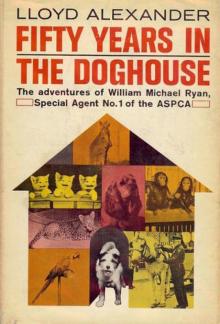 Fifty Years in the Doghouse
Fifty Years in the Doghouse The High King
The High King The Remarkable Journey of Prince Jen
The Remarkable Journey of Prince Jen The Book of Three
The Book of Three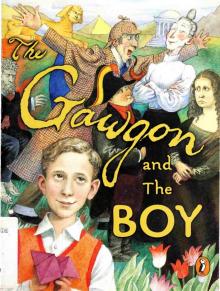 The Gawgon and the Boy
The Gawgon and the Boy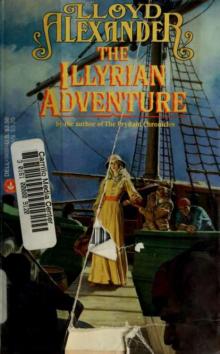 The Illyrian Adventure
The Illyrian Adventure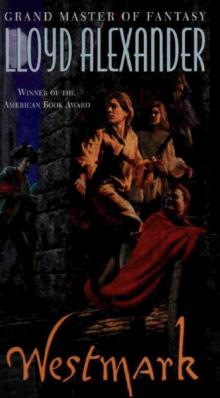 Westmark
Westmark The Black Cauldron
The Black Cauldron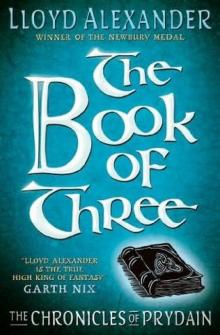 The Book of Three cop-1
The Book of Three cop-1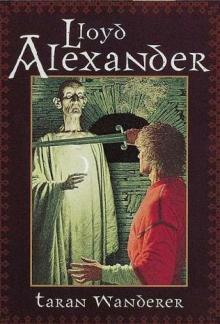 Taran Wanderer cop-4
Taran Wanderer cop-4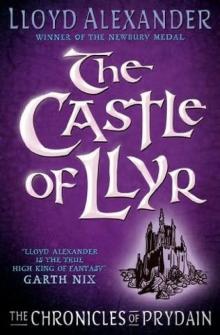 The Castle of Llyr cop-3
The Castle of Llyr cop-3 The High King (Chronicles of Prydain (Henry Holt and Company))
The High King (Chronicles of Prydain (Henry Holt and Company))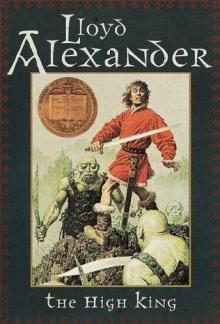 The High King cop-5
The High King cop-5 The Foundling
The Foundling The Castle of Llyr (The Chronicles of Prydain)
The Castle of Llyr (The Chronicles of Prydain)